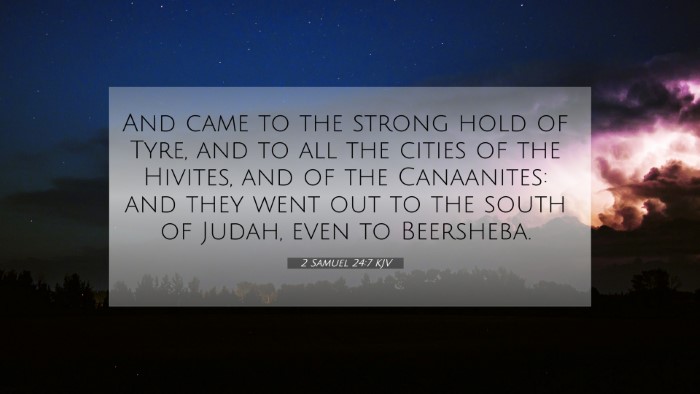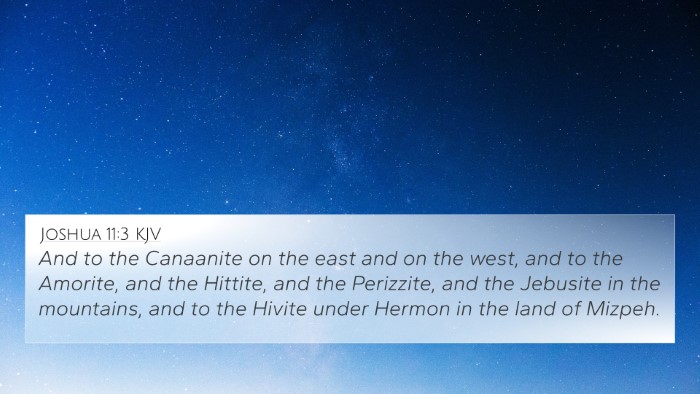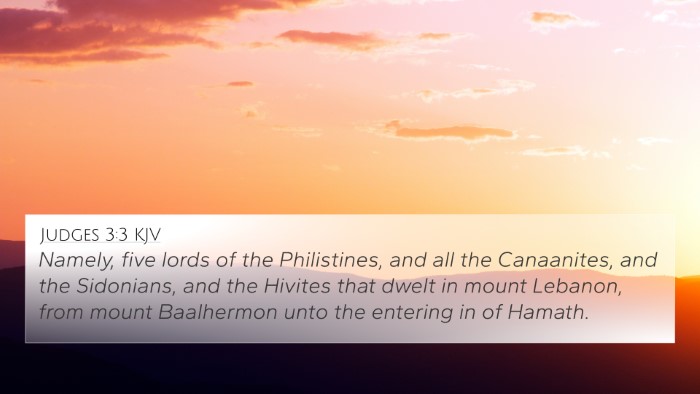Understanding 2 Samuel 24:7
2 Samuel 24:7 reads:
"And they came to the stronghold of Tyre, and to all the cities of the Hivites, and to the Canaanites: and they went out to the south of Judah, even to Beer-sheba."
Overview
This verse is part of a larger narrative concerning King David's census of Israel, which ultimately invoked God's displeasure. The census illustrated not only David’s administrative strength but also an underlying mistrust in God's provision and protection.
Verse Meaning and Insights
- The Context of the Passage: The actions leading to this verse reveal the political and military scope of David’s reign, illustrating the geographical extent of Israel's territory. (Albert Barnes)
- Historical Significance: The mention of cities like Tyre and others indicates the extensive alliances and conflicts that marked ancient Israel’s history. Tyre was a stronghold, representing both challenge and opportunity for David’s military campaigns. (Matthew Henry)
- Theological Implications: This verse emphasizes God's sovereignty in guiding His people, even during David's flawed decisions, highlighting themes of divine judgment and mercy. (Adam Clarke)
- Lessons of Obedience: The overarching narrative serves as a reminder of the importance of reliance on God’s guidance over human endeavors, underscoring why David's census resulted in divine anger. (Albert Barnes)
Cross-References
This passage connects meaningfully with several other scripture verses:
- 1 Chronicles 21:1-2: This account elaborates on the circumstances surrounding the census and provides additional context for David’s actions.
- Psalm 139:1-3: Speak to God's omniscience and awareness of our actions, contrasting with David’s misstep to count his people.
- Exodus 30:12: Discusses the proper conduct in taking a census and the importance of honoring God in such matters.
- Numbers 14:44: Reflects on previous failures of Israel to trust in God, drawing a parallel with David’s actions.
- 2 Samuel 24:10: This directly follows the account, revealing David's guilt for his actions and the immediate consequences thereof.
- Matthew 6:30: Highlights God’s provision and the folly in believing we can achieve everything through our might.
- Micah 5:2: References the geographic area around David’s rule, connecting to the broader messianic narrative.
Connections Between Bible Verses
In exploring connections between different scriptures, we see thematic links addressing human sin, divine judgment, and God's continuous commitment to guide His people:
- Thematic Bible Verse Connections: Each of these referenced passages unfolds a narrative emphasizing reliance and obedience to God rather than human strength.
- Comparative Bible Verse Analysis: The consequences of David's actions carry a warning applicable to contemporary readers about the desolation following pride and disobedience.
- Scriptural Cross-Referencing: This practice enriches our understanding of God’s covenant relationship with humanity, illuminated through varied passages that speak to trust and obedience.
Applying 2 Samuel 24:7 in Biblical Studies
Understanding the connections and implications of this verse can greatly enhance Bible study approaches:
- Using Bible Concordance: A reference guide can help spot significant connections throughout scripture.
- Cross-Reference Bible Study: Engaging in cross-referencing aids in identifying patterns, errors, and God’s grace across the text.
- Comprehensive Bible Cross-Reference Materials: Utilizing these resources will allow deeper insight into the narrative flow and theological themes present in the Bible.
Conclusion
In studying 2 Samuel 24:7, a broader understanding of ancient Israel's military conquests is revealed, coupled with crucial lessons regarding faith and obedience. As we utilize tools for Bible cross-referencing, we uncover the depth and interconnectedness of scripture, promoting spiritual growth and deeper faith.







